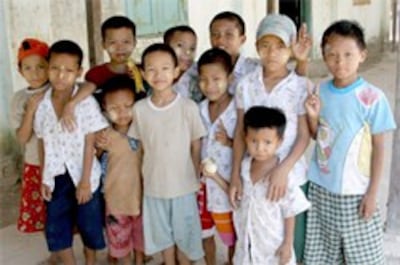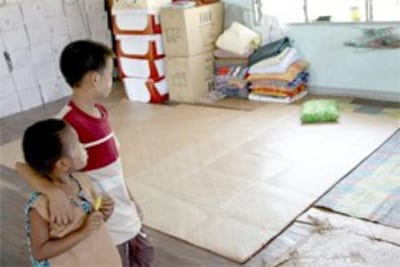By TYLER CHAPMAN
RANGOON—Even now, a year later, their faces are mostly masked in sadness. Some can barely smile.
The orphans of Cyclone Nargis were found clinging to trees, in the rubble of their homes, in the unimaginable wreckage that the wind, rain, and storm surge left behind from the night of May 2, 2008.
For the most part, they were alone, their parents dead, their extended families shattered, their friends gone, too.
And they were scarred, physically and mentally.
"Some were so traumatized," a monk told me, "they had forgotten their names."
The monk runs a monastery on the edge of the Irrawaddy Delta, where most of the 140,000 dead or missing victims of Nargis lived.
He is caring for 160 boys and girls, most of them Nargis orphans.
"Some of these children will take years to recover," he said.
"Some may never get over it. We cannot imagine what they have gone through. It's incredible that some survived at all."
Father figure

It was clear to me that the monk, in his 40s, had become a father figure to many of the children.
With the help of donors and volunteers, he feeds them, gives them an education, and provides them with the safe home of his monastery. A few follow him wherever he goes.
Look at the pictures I took to accompany this story: some smiles amid a wealth of sadness. The monk asked me not to show his face.
A local donor is building a dormitory for the children. He personifies the outpouring that has flowed from the Burmese public to Nargis victims.
Almost immediately after the cyclone hit, people streamed toward the delta with water, food, blankets, tools—whatever they thought could help—with Buddhist monks in the forefront.
No warning
That's more than can be said about the military government.
The junta at the time was preoccupied with a national referendum on a new constitution to cement its hold on power.
It blocked international relief, went ahead with the vote on May 10, and proudly announced the that constitution had been overwhelmingly approved.
"First, the government didn't warn us Nargis was coming," a friend told me. "Then it took two weeks to do anything about it."
Like many Burmese, a friend of mine stepped into the breach.
He asked friends overseas for donations and put together a medical team that headed south into the delta. He raised U.S. $10,000 and said his team treated at least 5,000 people.
"You would be amazed if you could see how the people of Burma and the international community really care," he said. "Our government cannot cope with something like this."
Uncounted orphans

He, too, was struck by the number of orphans. No one still knows how many there are.
"Many sad stories heard," he e-mailed at the time.
"Most of them are sole survivors of their families. Some lost not only their immediate families, but all of their relatives. Psychological trauma is evident in all of them."
Amid an international outcry, the junta relented and let relief agencies in, almost four weeks after the storm.
"Finally, it was the middle-level people in the ministries who mobilized," said a relief worker friend. "They knew it was bad. They are the compassionate ones."
Deep scars

I didn't go into the delta on my recent trip.
It would have required a government escort and, since I was traveling as a tourist, I didn't want to arouse suspicion.
Foreign journalists in general and Radio Free Asia in particular aren't exactly welcome in Burma.
From the accounts of friends, I know that homes and businesses are being rebuilt but that rice farmers and fishermen are having a tough time getting started again.
Drinkable water is a major problem since the floodwaters polluted so many ponds and wells.
"A year later, things are better," my relief worker friend told me.
"Housing and roads have improved. People have clothing. Everything they didn't have before, they have now. But for many, their families are gone. They are still grieving. There is a deep psychological scar."
Uncertain future
The government has continued to let foreign relief agencies do their work.
In a goodwill gesture of sorts, it allowed the top U.S. diplomat in Burma, Larry Dinger, to deliver 16,620 metric tons of rice to villagers in the delta and to tell them the American people were with them.
My friend predicts this kind of cooperation will last through June of 2010, when a national election is scheduled to choose a new government under the new constitution.
The junta calls it a transition to democracy, although the military is guaranteed to remain in power.
"They want people's support as the election approaches," my friend said.
"So they have to be nice. They think if they're nice, people will support them. After the election, who knows what will happen."
There is one thing I do know. The orphans I met will have a new dormitory and maybe, I hope, a few more smiles.
Tyler Chapman is a pseudonym to protect the author's sources. This is his second visit to Burma for Radio Free Asia.
